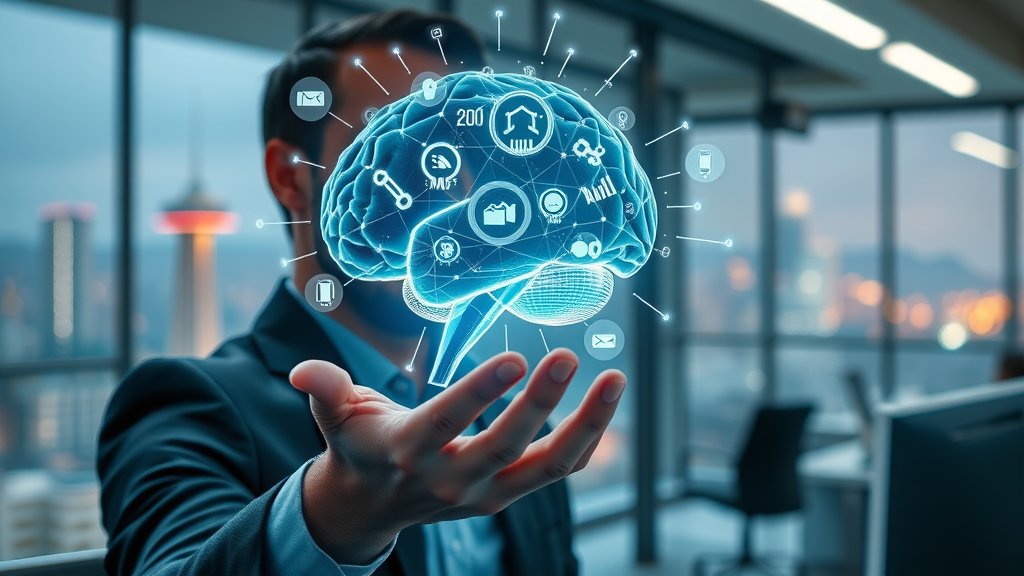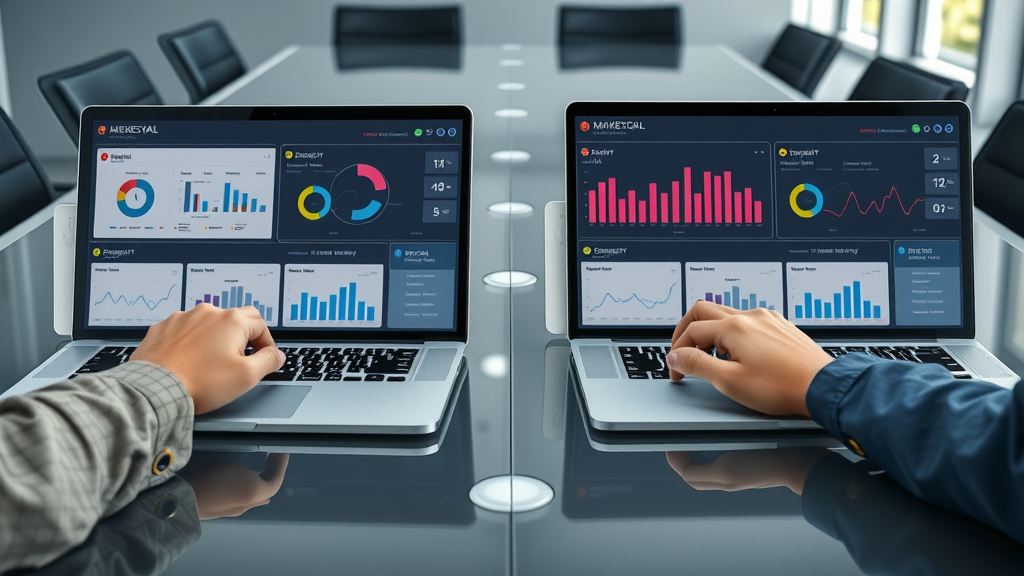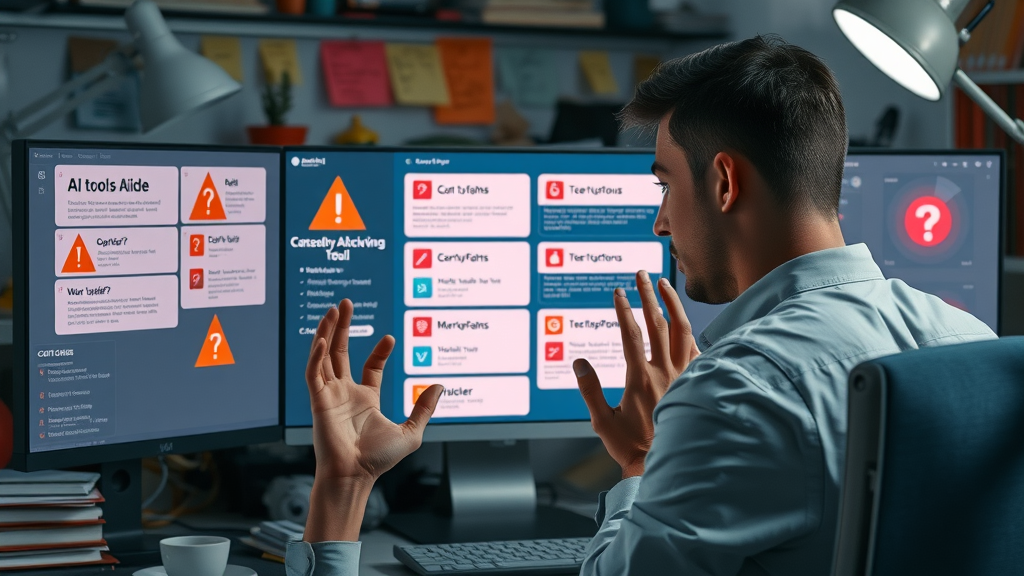Did you know that businesses using AI-driven marketing strategies are 2.5 times more likely to grow their revenue at a faster rate than those who don't? In today’s digital market, artificial intelligence has gone from being a futuristic idea to an essential part of smart, results-oriented marketing. Whether you run a boutique, a service agency, or an online store, harnessing the right AI marketing tools can transform your marketing efforts, drive real customer engagement, and help you stand out from your competitors. This comprehensive guide unpacks how you can use AI in marketing to boost your sales—even if you’re just getting started.

Unlocking Growth: The Power of AI-Driven Marketing Strategies
If you’re seeking immediate ways to enhance your marketing campaigns and get the most out of your marketing tools, embracing AI-driven marketing strategies is a crucial step. AI in marketing isn’t just a buzzword—it represents a fundamental shift in how businesses of all sizes are reaching customers, optimizing campaigns, and increasing ROI. With the proliferation of AI tools, even small marketing teams can now access the kind of sophisticated insights and automation once reserved for large corporations. Through machine learning, predictive analytics, and generative AI, AI-powered strategies empower local business owners to respond faster to market changes and deliver highly personalized customer experiences, directly influencing conversion rate and overall sales.
Adopting AI marketing strategies ensures you’re not left behind in a fast-paced digital market. By leveraging data-driven approaches, your marketing team can automate repetitive tasks, analyze customer behavior efficiently, and create targeted campaigns that resonate with real people. This results not only in operational efficiencies but also in remarkable improvements in customer engagement, providing a robust competitive advantage. In the following sections, you’ll learn exactly what AI-driven marketing strategies entail, why they matter for your business, and how to successfully implement them to maximize your business growth.
- Understand the basics and benefits of AI-driven marketing strategies
- Differentiate between traditional and AI-powered marketing approaches
- Identify core AI tools and features for small business marketing success
- See real-world examples of AI marketing tools in action
- Follow step-by-step guidelines for integrating generative AI into your marketing strategy
- Avoid common pitfalls when adopting new technologies
- Access answers to top questions about AI in marketing
Understanding AI-Driven Marketing Strategies
What is AI-Driven Marketing?
AI-driven marketing refers to the use of artificial intelligence and machine learning technologies to streamline, optimize, and personalize every aspect of your marketing efforts. Unlike traditional methods that rely on manual research or intuition, AI in marketing leverages massive amounts of customer data—gathered from your website, social media, past campaigns, and more—to instantaneously uncover patterns, predict trends, and automate tasks. Think of AI marketing tools as your smartest team member: they analyze, process, and recommend actions to reach your customers more effectively and efficiently than ever before.
Through AI tools, marketers now have access to advanced functions such as predictive analytics for campaign planning, dynamic audience segmentation, and personalized content creation. For example, a retail shop can use AI to send customized product recommendations to shoppers based on their browsing history, while a local service provider can automate follow-up emails based on customer behavior. These strategies deliver not just relevance, but also timeliness and personalization—cornerstones of successful digital marketing today.

“Artificial intelligence is not the future of marketing, it is the present.” – Marketing Thought Leader
The Role of Artificial Intelligence in Marketing
The fundamental role of artificial intelligence in marketing is to transform everyday marketing tools, strategies, and campaigns into intelligent, data-driven systems. AI analyzes customer data at astonishing speed, providing actionable recommendations to marketing teams and business owners. Use cases include everything from scheduling posts on social media to identifying patterns in customer behavior to optimize campaigns on the fly. Modern AI marketing tools combine big data analytics with natural language processing, predictive analytics, and even content generation, making it easier than ever for small businesses to punch above their weight.
For small businesses, this means not only working smarter but truly understanding your audience in a way that was previously impossible. By integrating AI tool capabilities, teams are able to adjust marketing campaign messages in real-time, improve the timing of their outreach, and continually refine marketing strategies based on fresh data. AI in marketing is thus more than a support system—it’s a foundational shift, helping business owners elevate their marketing efforts with less guesswork and more precision.
How AI-Driven Marketing Strategies Differ from Traditional Approaches
Traditional marketing strategies largely depend on historical data, one-size-fits-all messaging, and trial and error. In contrast, AI-driven marketing strategies use advanced algorithms and real-time data analysis, enabling rapid decision-making and highly personalized campaigns. Rather than sending blanket promotions, AI tools segment customers based on activities and interests, delivering content that’s uniquely relevant for each person. This transition from guesswork to insight dramatically improves conversion rates and customer experience, delivering measurable impact on marketing ROI.
Additionally, AI-driven tools automate time-consuming tasks such as A/B testing, lead scoring, and campaign reporting—freeing up your team to focus on creative, strategic work. The result? Marketing campaigns that adapt and evolve as quickly as your customers’ needs change, keeping you a step ahead in an increasingly competitive digital market landscape.

Why Implement AI-Driven Marketing Strategies in Your Business
Benefits: Increased Efficiency and ROI
The biggest incentive for adopting AI-driven marketing strategies is the opportunity to dramatically increase efficiency and ROI. By automating repetitive tasks and leveraging detailed customer data, businesses can identify what’s working and refine every aspect of their marketing efforts. AI tools excel at both speed and scale—automating processes, predicting outcomes, and maximizing the value of your marketing spend. Machine learning algorithms spot trends, optimize campaigns in real-time, and help marketing teams deploy resources where they’ll have the most impact, transforming productivity overnight.
For small businesses where every dollar counts, these efficiencies are game-changers. AI marketing tools also help minimize waste in advertising budgets by precisely targeting the right customers at the right moments. The bottom line: with AI, you do more with less, improve your conversion rate, and see measurable results faster than ever before.

Understanding Customer Engagement with AI
AI goes beyond surface-level analytics to reveal exactly how customers interact with your campaigns, website, and social media platforms. By using AI in marketing to map out the entire customer journey, you gain invaluable insights into customer behavior and engagement patterns. AI analyzes touchpoints in real time and can trigger follow-up messages, recommendations, or offers tailored to individual preferences and past interactions. This increases not only engagement rates but also customer satisfaction and loyalty.
Engaged customers are more likely to convert, spend more, and become brand advocates. AI-driven marketing strategies empower your marketing team to cultivate deeper and more authentic customer relationships—even if your business is small or just getting started. Ultimately, the more relevant and personalized your outreach, the stronger your brand presence becomes.
Key Results Achieved by AI Marketing
Results speak volumes, and the statistics are clear: companies harnessing AI-powered marketing strategies report significant growth across multiple metrics. Enhanced personalization typically results in a 20-30% sales uplift, while AI-powered predictive analytics can double the effectiveness of targeted campaigns. AI can also reduce marketing waste by as much as 50% by prioritizing the right audiences and optimizing content in real-time.
For small businesses, these advances translate into tangible, bottom-line gains: higher conversion rates, improved customer lifetime value, and a more robust, competitive position in your niche. When marketing teams use AI to learn from every customer interaction, every new campaign becomes smarter and more successful than the last.
The Core Elements of Successful AI-Driven Marketing Strategies
Predictive Analytics for Smarter Marketing Campaigns
One of the cornerstones of effective AI-driven marketing strategies is the use of predictive analytics. This technology taps into data from multiple sources—including past campaigns, website activity, and customer demographics—to anticipate future behaviors and outcomes. For instance, predictive analytics can forecast which customers are most likely to respond to an offer, the best times to reach out, or which products will trend in your digital market next season.
By letting AI tools crunch the data, marketing teams can optimize campaigns quickly, shifting resources or messaging to where it counts most. Predictive analytics isn’t just for huge brands; small businesses can leverage affordable AI marketing tools to plan smarter, allocate budgets more efficiently, and increase marketing ROI month after month.
If you're interested in practical ways to implement these concepts, you might find it helpful to explore how small businesses are transforming their marketing strategies with advanced AI tools like ChatGPT-o3. This approach can provide hands-on tactics for integrating conversational AI into your campaigns and elevating your results. Discover actionable methods for using ChatGPT-o3 in small business marketing.

Audience Segmentation and Customer Data Utilization
Audience segmentation is where AI really shines. AI marketing tools analyze vast amounts of customer data—including purchase history, location, browsing habits, and even social media sentiment—to create highly specific audience groups. With advanced segmentation, every marketing campaign can be tailored to resonate with the daily problems, preferences, and values of your chosen audience.
This approach means your marketing efforts aren’t wasted on generic messaging. Instead, each campaign delivers targeted, relevant content to the people who are most likely to take action. For local businesses in particular, AI-powered audience segmentation unlocks new possibilities to personalize offers, boost conversion rates, and build long-term relationships with your ideal customers.

Personalized Content Creation Using AI Tools
Content is the lifeblood of digital marketing—but generic content rarely gets results. That’s where AI tools make a difference: they create, test, and optimize content for distinct audience segments with minimal manual effort. Generative AI platforms, for example, use natural language processing and machine learning to draft blog posts, email campaigns, ad copy, and even social media captions that sound distinctly human and are proven to convert.
Personalized content creation ensures that every touchpoint in your marketing journey speaks directly to your customers’ needs. AI can adjust messaging based on current events, previous interactions, or trending keywords, all in real-time. This not only boosts customer engagement but also presents substantial time-savings for your team—meaning even a small staff can deliver the impact of a much larger operation.
Improving the Customer Journey with AI in Marketing
The best marketing strategies put the customer journey at the center, and AI is the perfect partner for mapping, monitoring, and enhancing every stage of this journey. AI marketing tools track customer touchpoints from initial outreach through post-purchase engagement, ensuring no opportunity slips through the cracks. Automated follow-ups, tailored offers, and intelligent chatbots all combine to foster seamless customer experiences.
Ultimately, a well-orchestrated AI-driven approach means every customer interaction feels personalized and intentional. Over time, this leads to greater loyalty, higher customer lifetime value, and a marketing machine that improves itself through constant feedback.
Step-by-Step Guide: Implementing AI-Driven Marketing Strategies
- Analyze Your Current Marketing Tools and Data
- Identify Strategic Goals for AI Integration
- Choose the Right AI Marketing Tools for Small Businesses
- Deploy Generative AI for Content Generation and Distribution
- Integrate AI Tools with Your Existing Marketing Stack
- Train Your Team and Set Clear KPIs
- Measure Campaign Performance and Iterate Based on Results
Analyze Your Current Marketing Tools and Data
Begin your AI-driven journey by taking stock of the marketing tools and customer data you already have. Identify which platforms you use for social media, email, analytics, and content creation. Assess what data you’re currently collecting—such as website traffic, customer demographics, and campaign metrics. This review will reveal both strengths and gaps, clarifying where AI integration can deliver the biggest improvements. Clean, organized data is essential: AI tools rely on high-quality input to provide accurate recommendations and predictions.
Next, pinpoint where your marketing strategy falls short. Are you missing customer engagement opportunities? Are your marketing campaigns underperforming? With these insights, you can select the right AI marketing tool to enhance outcomes, create better segmentation, and increase efficiency across your entire marketing efforts.
Choose the Right AI Marketing Tools for Small Businesses
Choosing an AI marketing tool tailored to your business is crucial for success. Consider your goals—do you want to automate social media, generate personalized emails, or improve predictive analytics? Evaluate platforms that integrate easily with what you already use and can scale as you grow. The best AI tools for small businesses offer pre-built templates, simplified interfaces, and strong customer support to help your marketing team hit the ground running.
Read reviews, watch demonstration videos, and test trial versions to compare usability. Remember, the most advanced tool isn’t always the best fit. Instead, prioritize solutions that align with your goals and empower your staff to deliver great customer experiences with minimum complexity.
Deploying Generative AI for Content Generation and Distribution
Once you’ve chosen your tools, deploy generative AI to accelerate content creation. Generative AI leverages machine learning and natural language capabilities to write compelling blog posts, emails, product descriptions, and more. These platforms can also suggest topics based on trending keywords in your digital market or personalize content based on audience segmentation.
Distribution matters just as much as creation. Many AI tools offer automated scheduling and multi-channel distribution, making it easy for small teams to consistently share fresh content with the right people at the right time. Track engagement metrics carefully and refine your content strategy based on what performs best.

Measuring Campaign Performance with AI Tool Integration
Effective marketing doesn’t stop at launch—it requires ongoing measurement and adjustment. Integrate your AI tools with analytics dashboards to monitor KPIs like click-through rates, conversions, and revenue growth. AI tools can automatically generate reports, offer actionable insights, and even suggest optimizations based on real-time data. This continuous loop ensures your marketing strategies become smarter and more effective with every campaign.
For beginners, look for platforms with clear visualizations, guided tutorials, and support resources so you and your marketing team can quickly interpret results and make data-driven decisions.
Critical Components: Choosing the Right AI Marketing Tools
Comparing Top AI Marketing Tools for Small Businesses
Not all AI marketing tools are created equal. For small business owners, it’s essential to evaluate features, pricing, integrations, and ease of use. Top contenders typically offer a mix of predictive analytics, content creation, automation capabilities, and audience segmentation. Consider platforms that seamlessly connect with social media and email marketing tools. Look for credible reviews or ask fellow local business owners to share their experiences.
Pay attention to the pricing structure—does the platform offer scalable plans or lock you into costly contracts? The best AI tools let you start small and add features as your business and marketing needs grow.

| AI Marketing Tool | Functions | Pricing (Monthly) | Best Use Case |
|---|---|---|---|
| HubSpot AI | CRM, automation, predictive analytics, email campaigns | $50–$800 | Comprehensive marketing automation |
| Jasper AI | AI content generation, ad copy, blog writing | $39–$99 | Content creation at scale |
| Mailchimp with AI | Email marketing, audience segmentation, A/B testing | $13–$350 | Email automation for SMBs |
| Hootsuite Amplify | Social media scheduling, AI sentiment analysis | $49–$129 | Social media automation |
Essential Features to Look For in AI Marketing Tool Selection
As you compare platforms, prioritize these essential features: intuitive dashboards, strong data integration, automation across multiple channels, robust reporting, and training resources. Search for AI tools that offer both predictive analytics and real-time data—so you can respond instantly to shifts in audience behavior. If content creation is critical, look for natural language generators with tested templates for emails, ads, and blog posts.
Lastly, ensure the tool supports seamless collaboration for your team, whether you’re working on a small scale or plan to grow in the future. Transparent pricing and responsive customer service are also must-haves.
Generative AI and Automation in Modern Marketing Tools
Generative AI is rapidly changing content generation, enabling small businesses to compete with much larger players. These platforms automatically draft outreach, craft innovative ads, or generate engaging blog posts based on keywords and audience profiles. Automated scheduling, personalized messaging, and performance tracking are now built into many leading marketing tools.
For local business owners, this means less time spent on routine tasks and more focus on strategy and growth. Choosing the right AI marketing tool supports ongoing automation, improves customer engagement, and ensures every marketing campaign is both efficient and impactful.
Real-World Success Stories: AI-Driven Marketing Strategies in Action
"Since adopting AI in marketing, our customer engagement rates have doubled!" – Local Business Owner
Small Business Case Studies
Consider the story of a neighborhood cafe that used AI-powered audience segmentation to deliver customized birthday offers—resulting in a 40% increase in repeat visits. Or a local clothing boutique that integrated generative AI tools to automate their social media promotions and schedule campaign launches based on predictive analytics. Their sales grew 25% in three months, all while maintaining a lean marketing team.
These cases highlight how even small shops can use AI marketing tools to build stronger relationships, ramp up customer engagement, and convert everyday patrons into loyal brand advocates. The payoff is visible in higher sales, better reviews, and more efficient use of precious resources.

Lessons Learned from Effective AI Marketing Campaigns
Real-world success stories reveal several valuable lessons: first, start small and scale your use of AI in marketing as you grow. Second, set clear goals and regularly measure performance with reliable reporting tools. Third, don’t be afraid to test and iterate—AI learns from data, and so can your business. Finally, prioritize customer experience: AI is a tool to help you serve your clients better, not just a shortcut for quick wins.
Keeping these strategies in mind will help your small business build a robust, future-ready marketing strategy with AI at its heart.
People Also Ask: What is AI-driven marketing?
Answer: Understanding the Foundations of AI-Driven Marketing
AI-driven marketing refers to the use of artificial intelligence, such as machine learning algorithms and predictive analytics, to automate, optimize, and personalize marketing activities. AI tools process large amounts of customer data in real-time—making it possible for marketing teams to customize content, improve targeting, and measure campaign performance more efficiently than with traditional marketing strategies. This allows small businesses to maximize ROI, fine-tune messaging, and improve customer experiences across every marketing channel.
People Also Ask: How to use AI in your marketing strategy?
Answer: Practical Steps for Integrating AI in Marketing Strategy
To use AI in your marketing strategy, start by assessing your current tools and collecting high-quality customer data. Next, choose AI marketing platforms that fit your needs—whether it’s for content creation, campaign automation, audience segmentation, or predictive analytics. Deploy generative AI to produce email content, personalize social media posts, and automate responses to customer interactions. Finally, integrate AI dashboards with your analytics to monitor performance and continually improve your campaigns based on real-time insights.
People Also Ask: What is the best AI for marketing strategy?
Answer: Leading AI Tools and Their Marketing Strategy Applications
The best AI for a marketing strategy depends on your business goals and size. For all-in-one marketing automation, HubSpot AI or Mailchimp with AI features are top choices. For content generation, Jasper AI is a leader, while Hootsuite Amplify excels at social media automation and analysis. Each ai marketing tool offers unique features, so compare based on integration options, ease of use, and cost. Choosing a solution that fits your existing marketing workflow and data needs is key to long-term success.
People Also Ask: Is 90% of AI marketing?
Answer: Demystifying Market Penetration and the State of AI Marketing
While you may hear statistics like “90% of marketing is AI,” the reality is more nuanced. AI-driven marketing strategies are rapidly becoming mainstream, with most large companies—and a growing number of small businesses—leveraging AI marketing tools in some capacity. However, not all marketing is fully automated. The most successful businesses combine AI insights with human creativity and customer understanding to create impactful campaigns. The trend is clear: the future of marketing is increasingly AI-powered, but human oversight remains essential.
Mistakes to Avoid in AI-Driven Marketing Strategies
Even the best AI-driven marketing strategies can fall short if common mistakes aren’t avoided. Over-relying on technical automation without a clear strategy, choosing tools with features you don’t need, or failing to regularly review campaign results can all derail your marketing efforts. By staying aware of these pitfalls and paying close attention to your marketing tool selection and customer feedback, you safeguard your investment and set your campaigns up for lasting success.

- Implement AI without specific goals or KPIs in mind
- Choose overly complex tools not suited for your team or business scale
- Neglect regular data review, leading to missed optimization opportunities
- Overlook customer feedback and human creativity
- Ignore training and onboarding, resulting in poor tool adoption
"Avoid shiny object syndrome—choose AI marketing tools that align with your real business needs."
FAQs: AI-Driven Marketing Strategies for Beginners
- Is AI marketing expensive? No, many AI tools offer plans starting under $50/month tailored for small businesses. Start with a free trial before committing.
- Do I need to be a tech expert to use AI in marketing? No, leading platforms are beginner-friendly and provide tutorials, templates, and customer support to help you get started.
- What’s the difference between AI and automation in marketing? Automation handles repetitive tasks, while AI analyzes data, makes predictions, and personalizes content for better results.
- How soon can I expect results with AI-driven strategies? Most businesses see improvements in engagement and efficiency within the first few months of integrating the right AI marketing tools.
- Can AI improve social media marketing? Absolutely, AI automates scheduling, analyzes performance, and personalizes content for each audience segment on your chosen social networks.
Key Takeaways: Pro Tips for AI-Driven Marketing Strategies
- Start with clear marketing goals and gradually integrate AI where it matters most
- Prioritize tools that are easy to use and offer practical automation features
- Monitor campaign performance with AI dashboards for continuous improvement
- Don’t forget the power of creativity—combine AI insights with human intuition
- Regularly review and update your strategy as new AI capabilities emerge
Final Thoughts on AI-Driven Marketing Strategies

Embracing AI in Marketing for Lasting Growth
Adopting AI-driven marketing strategies isn’t just about technology—it’s about creating smarter, more human, and highly effective ways for small businesses to thrive. Start your journey today!
As you continue to refine your marketing approach, remember that the landscape is always evolving. Exploring innovative solutions like ChatGPT-o3 can help you stay ahead of the curve, offering new ways to connect with your audience and streamline your workflow. For a deeper dive into how conversational AI and advanced automation can transform your small business marketing, take a look at our comprehensive guide on transforming your marketing strategies with ChatGPT-o3. Unlock the next level of growth by combining the power of AI with creative, customer-centric thinking—your future marketing success starts with the right insights and tools.
Ready to Grow Your Business? Contact Us Today at 818.716.2097
Sources:
To further enhance your understanding of AI-driven marketing strategies, consider exploring the following authoritative resources:
- “AI Driven Marketing: Definition, Strategies & Roadmap for CMOs” (gartner.com)
This comprehensive guide by Gartner outlines a strategic roadmap for Chief Marketing Officers to effectively implement AI-driven marketing, emphasizing the importance of balancing human and machine-driven strategies to maximize innovation and return on investment.
- “Eight AI-Powered Strategies To Transform Your Marketing Strategy” (forbes.com)
Published by Forbes, this article presents eight actionable AI-powered strategies that can revolutionize your marketing approach, including predictive customer insights and AI-enhanced global campaigns, providing practical examples from industry leaders.
By delving into these resources, you’ll gain valuable insights into the latest AI marketing strategies and tools, empowering you to implement effective, data-driven approaches that drive business growth.
 Add Row
Add Row  Add
Add 




Write A Comment